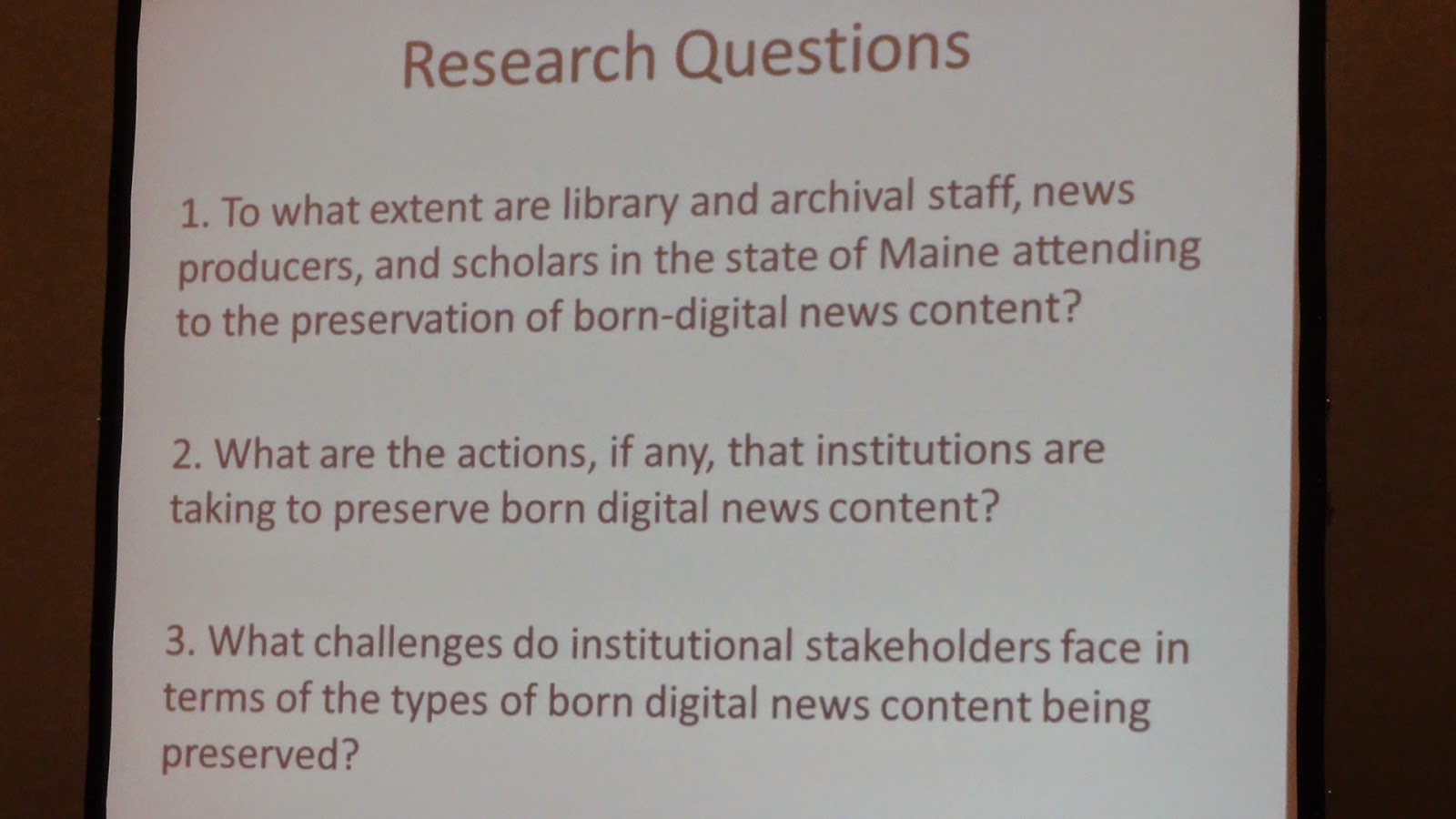Seeking Sustainable Solutions to 21st Century News: A Case Study of Born-Digital Preservation by Jennifer L. Bonnet and Jennifer E. Moore (presented paper: click here for the paper)
Only one of the authors, Jen Bonnet, was able to attend the conference, but she presented their study findings. Her research questions were:
 |
| from Jen Bonnet's ACRL presentation |
According to her study, about half the stakeholders are actually attending to the preservation of born-digital Maine news content, which is great! This is so important because Tweets, info graphics, online polls, and Facebook posts are often forgotten when considering what is worth preserving, as many shrug off the transient, online nature of these items and consider them other that an official record. However, if one of the charges of libraries is to store and protect the cultural record, then these things matter, at least as a representation of the medium's zeitgeist. On the other hand, data from the survey also shows a prominent decline in the stakeholder's opinion of importance of preserving tweets and Facebook posts compared to born digital news articles -- here, again, is evidence that social media content is not perceived as valuable to our cultural record compared to articles.
There were some other interesting trends in Bonnet and Moore's study: nearly every type of digital news content was deemed neutral to very important (2.5 to 5 on the scale) to be preserved by all the stakeholders (except online news ads, which were rated below neutral on the scale at 2.1 -- those online ads are so annoying it's a wonder that anyone wants to preserve them). Furthermore, all three groups of stakeholders that were surveyed (library and archival staff, archivists, and news workers) thought news organizations had the highest responsibility to preserve born-digital content.
Ultimately, I wished that the survey also had gathered data on what type of born-digital news content each of the stakeholders' institutions are actively preserving at the moment, so then we could see if the preservation policy covers mostly articles, or other content as well. Sure the Library of Congress is making progress with preserving the entire public Twitter feed, but it would be cool to see a news organization preserving their own Twitter feed!
This paper was one of those presentations that is really exciting but is also really frustrating: it gathered and presented many important figures, but it was not able to report any action in response. It definitely is valuable in two ways: it functions as both an environment scan and as a preservation survey analogy. First, the environment scan points the way towards prioritizing future endeavors for preservation of born-digital news content in the state of Maine (e.g. what to preserve; who should preserve it). Second, the preservation survey analogy is most strongly evidence to stakeholders that resources are required to address a documented problem -- in the preservation of physical collections, survey data is what gets the attention of library leaders.
 |
| from Jen Bonnet's ACRL presentation |
Revolutionary by Design: HathiTrust, Digital Learning and the Future of Information Provision by Kent LaCombe (presented paper: click here for the paper)
Mr. LaCombe was on fire for HathiTrust! So much so, he gave the disclaimer that he did not work for them a couple times. He's just a librarian who has fallen in love.
 |
| from Kent LaCombe's ACRL presentation |
LaCombe framed his presentation very much in the context of the benefits of digital vs. print, addressing the issue of the subjective and sometimes ignorant meaning we place on physical artifacts, as well as the issue of serendipitous browsing discovery. Additionally, he addressed the benefits of repositories like HathiTrust vs. subscriptions to databases, namely in that pricing is stable and content accessibility is stable. He used Google Books as a reference point to support his opinion that digital book content is more discoverable than print book content, and kept referring to Google Books as a partner of HathiTrust.
 |
| from Kent LaCombe's ACRL presentation |
A librarian asked a question during the Q&A portion of the presentation: What do you say to critics who ask what the benefit using HahtiTrust vs. the benefit of Google Books. LaCombe largely referred to the interface of HathiTrust as being more useful than that of Google Books. It was at this point that I really wanted to go up to the mic to share my own thoughts: what really sets HathiTrust apart from other library services, digital repositories, catalogs, and even Google is that it is a trusted digital repository and is OAIS compliant as such. It is totally set up to ensure the long term protection and access of the data stored in its mirrored server farm. HahtiTrust began when, after Google digitized the books of the pilot libraries' collections and handed the raw .tiff files over to the libraries, these pilot libraries got together to make a plan to preserve their files. I love HathiTrust because it assures me the digital content trend has devoted supporters who will ensure the future access to the digital records and that gives me a reason to celebrate digitized sources.
No comments:
Post a Comment